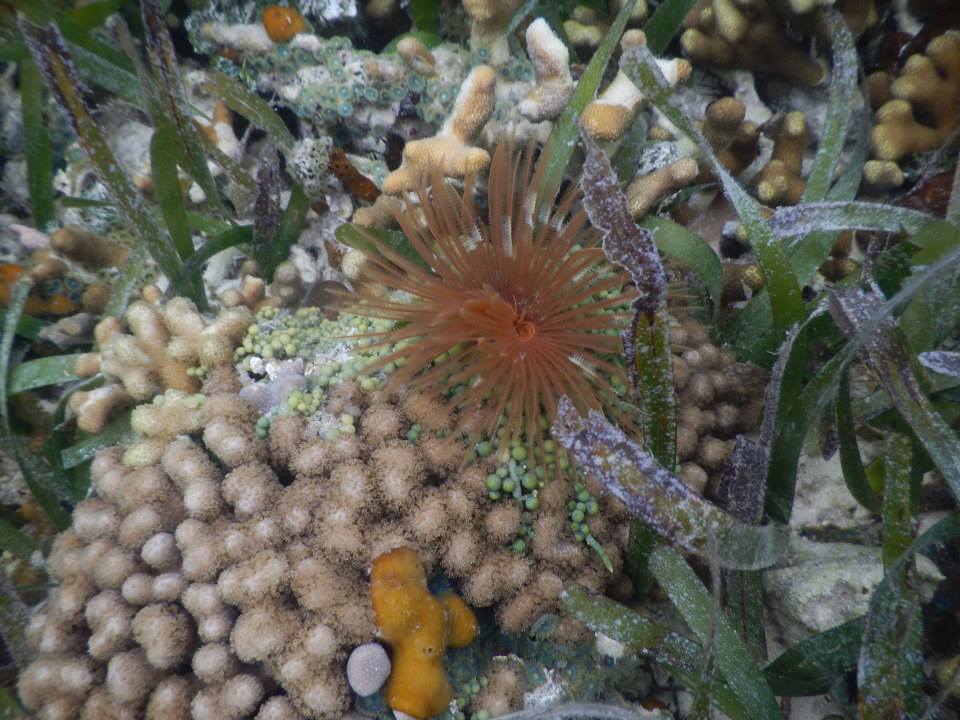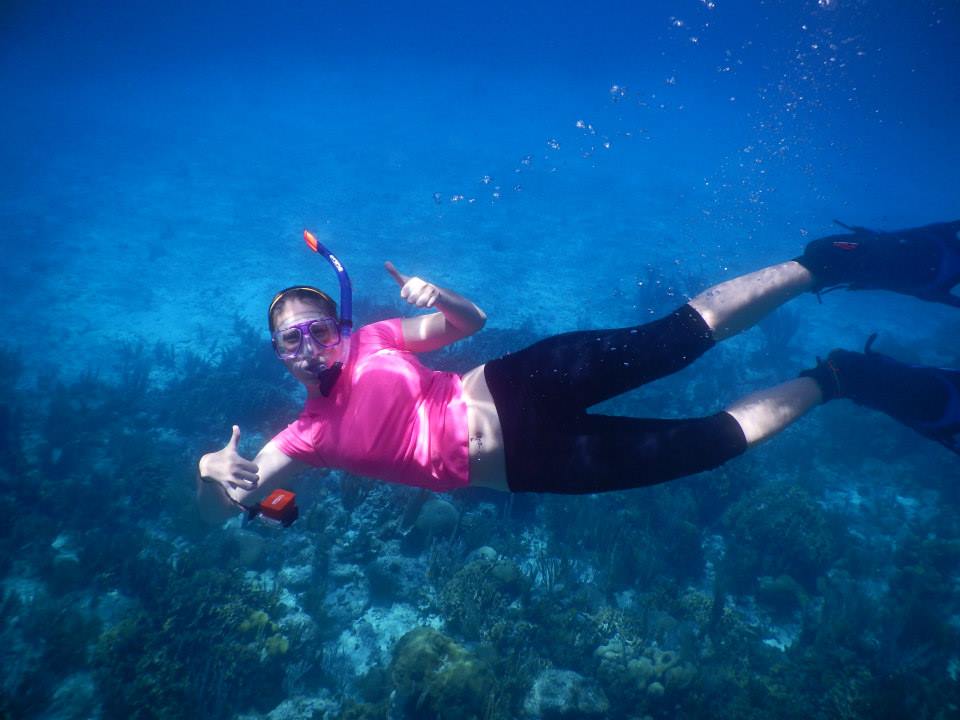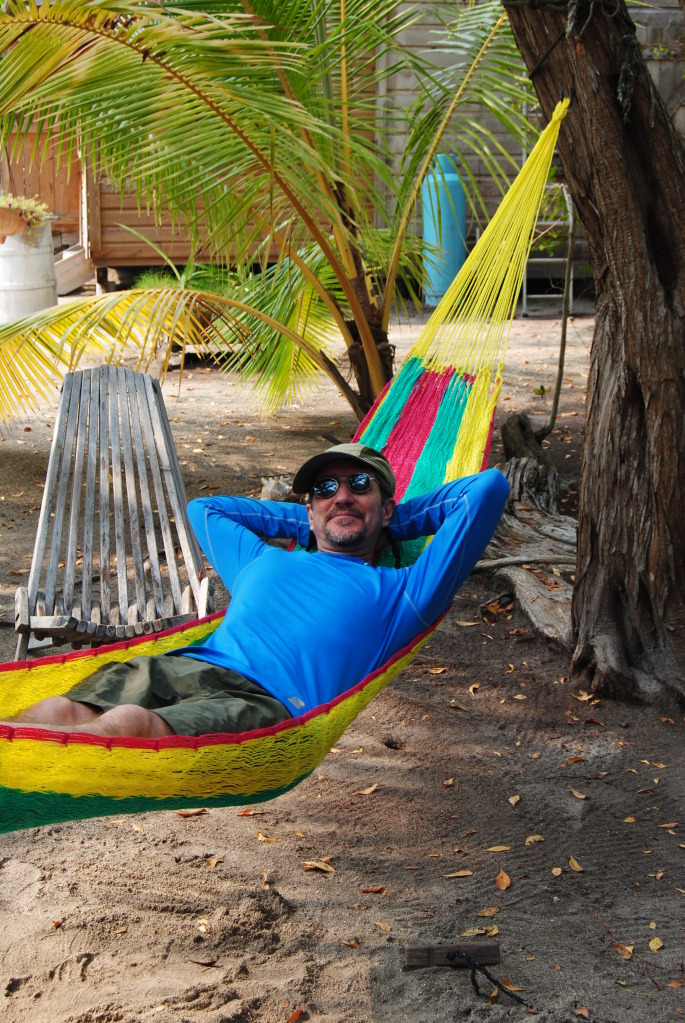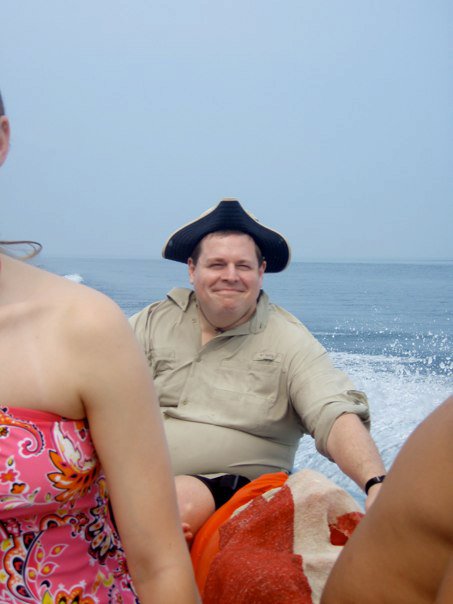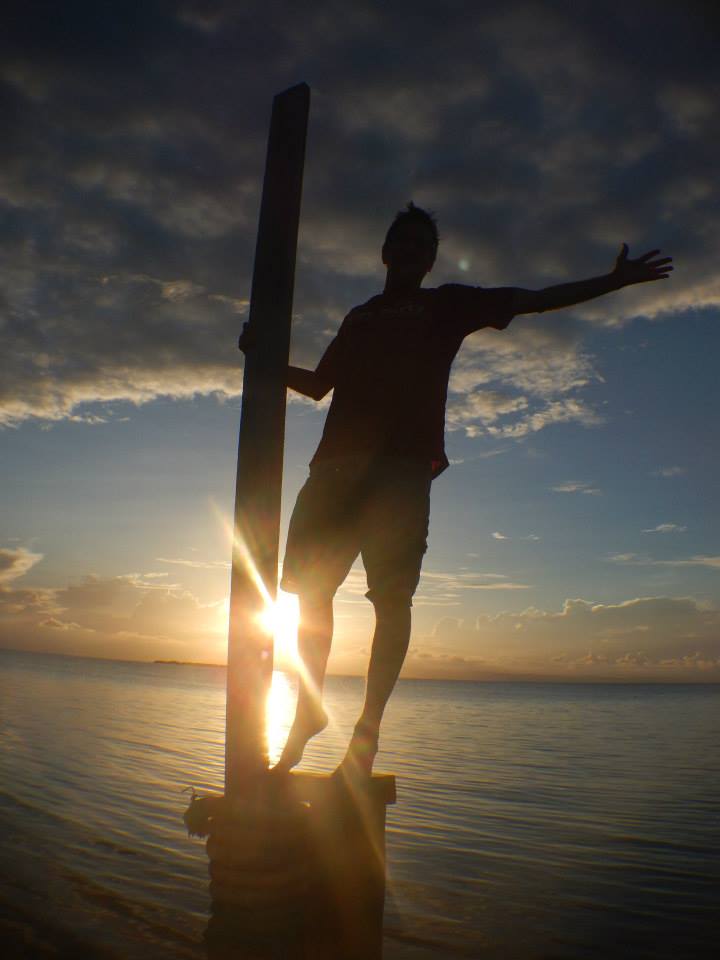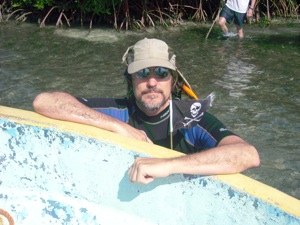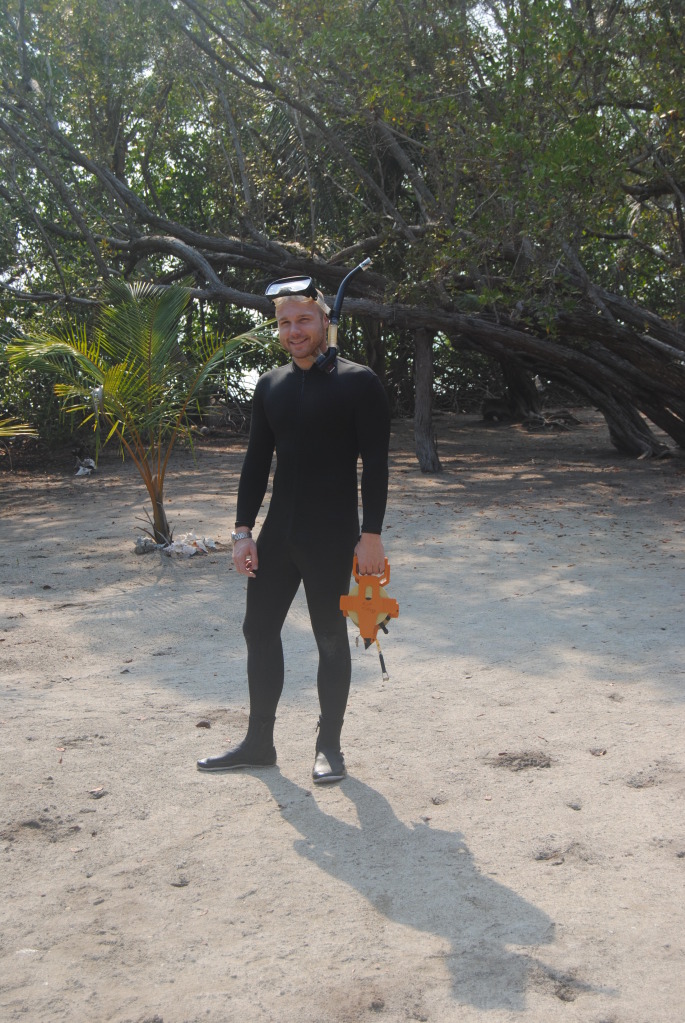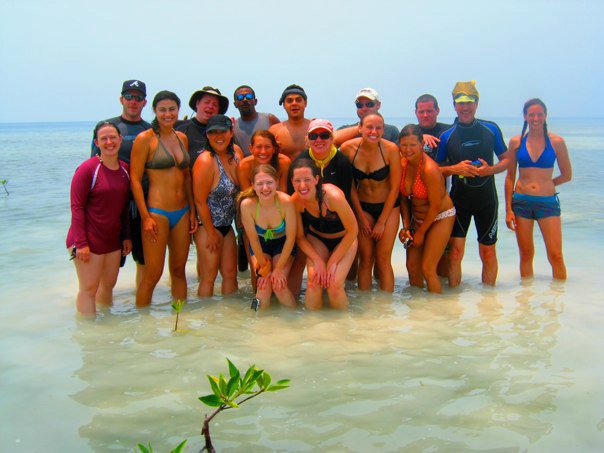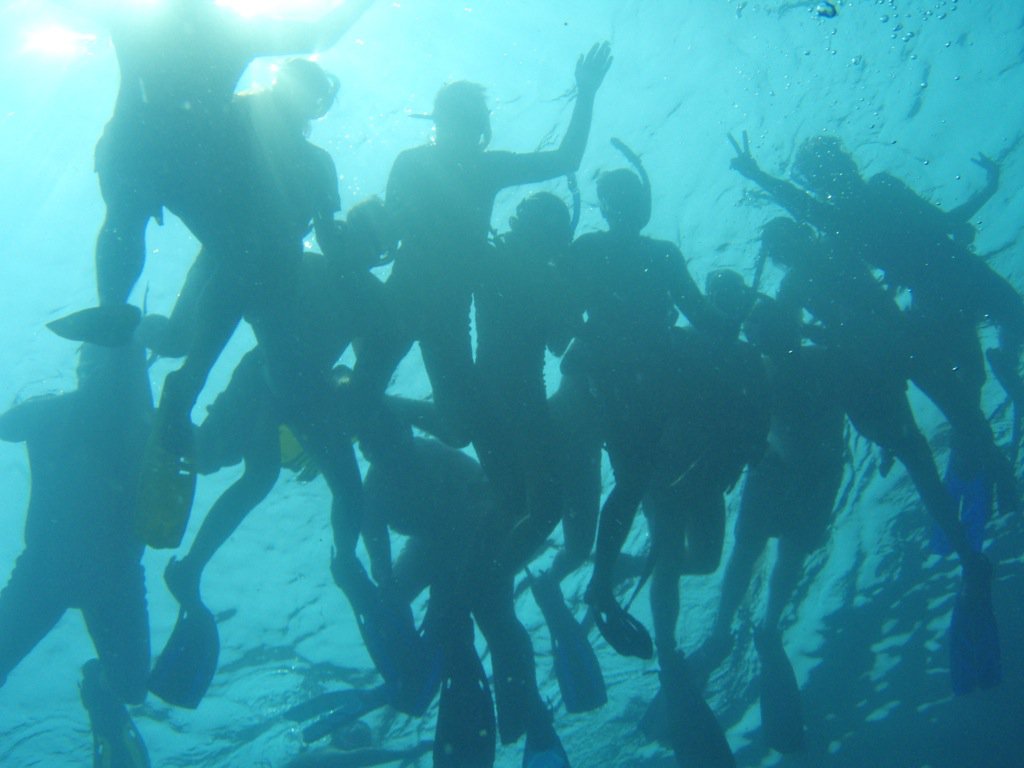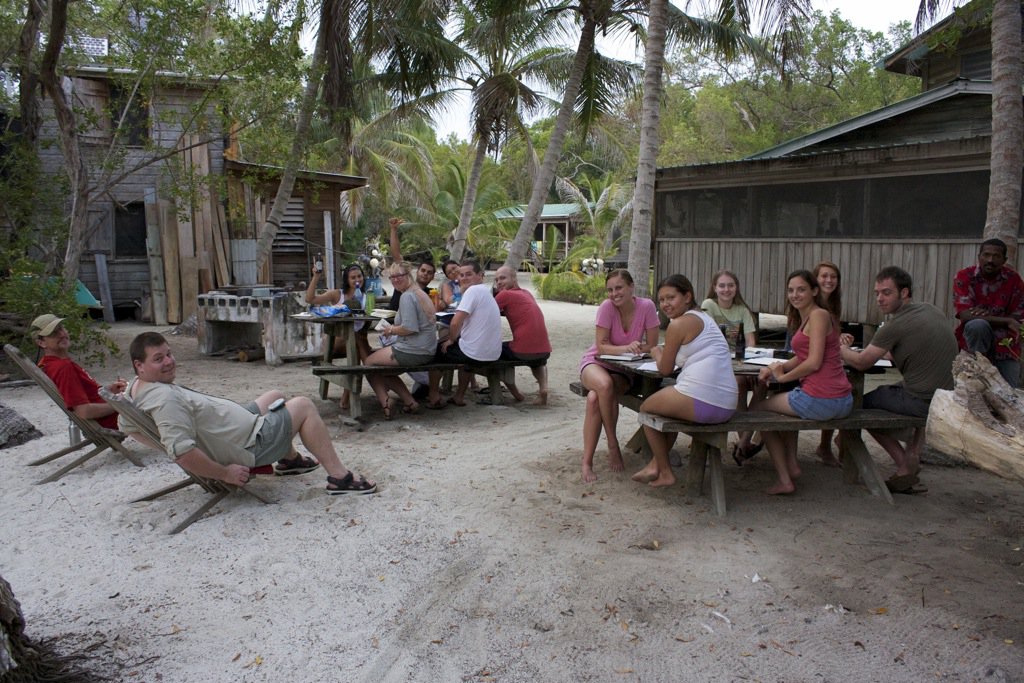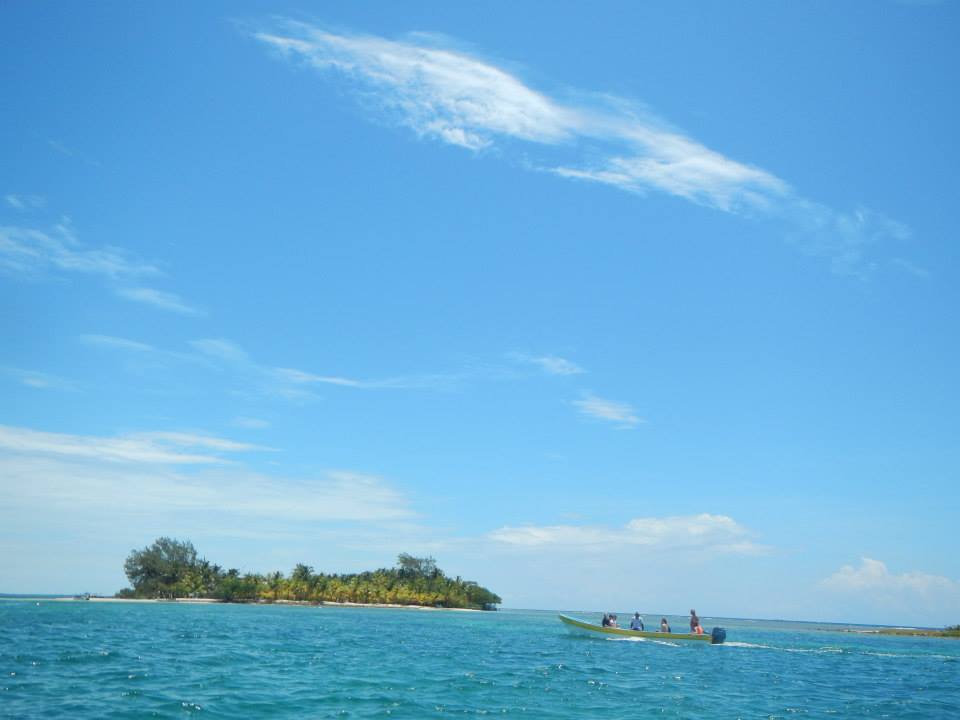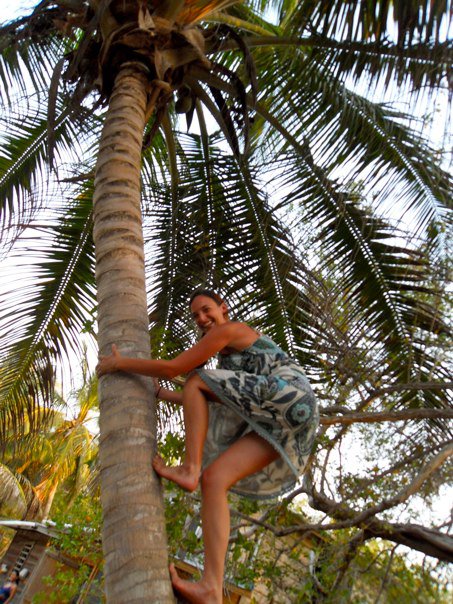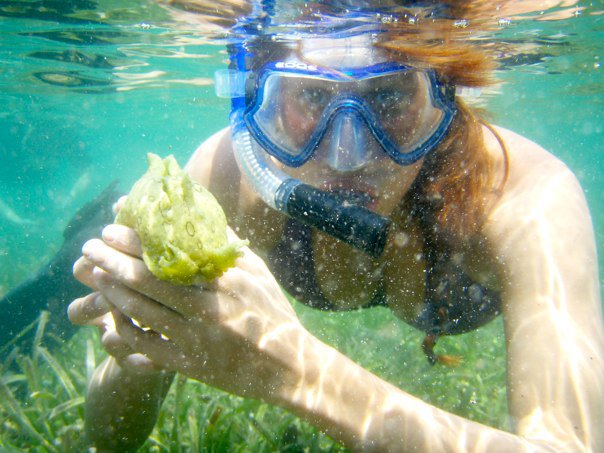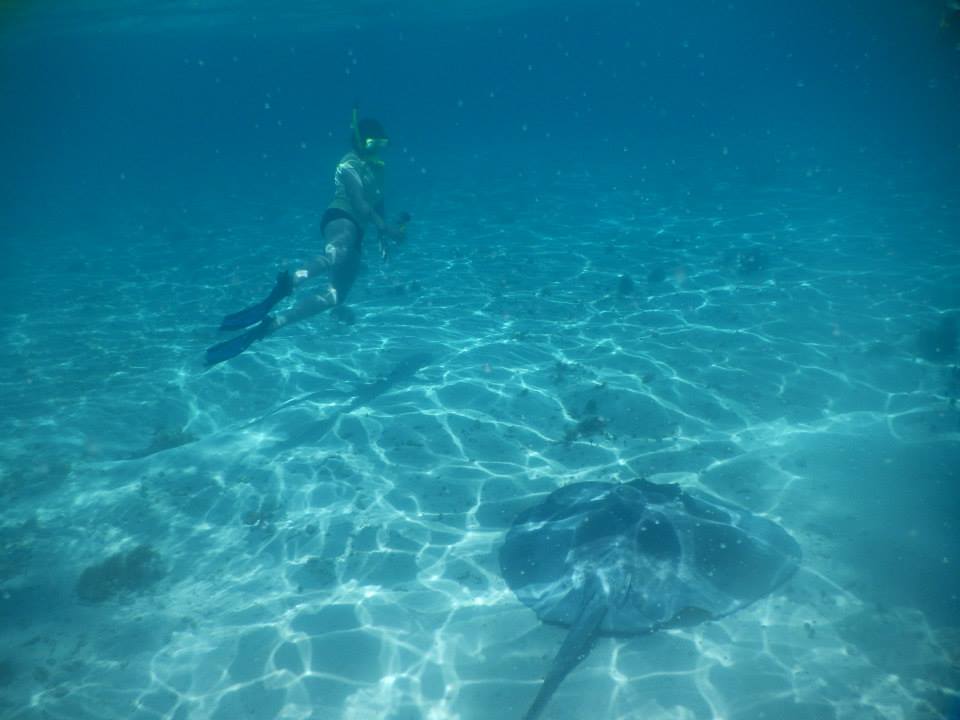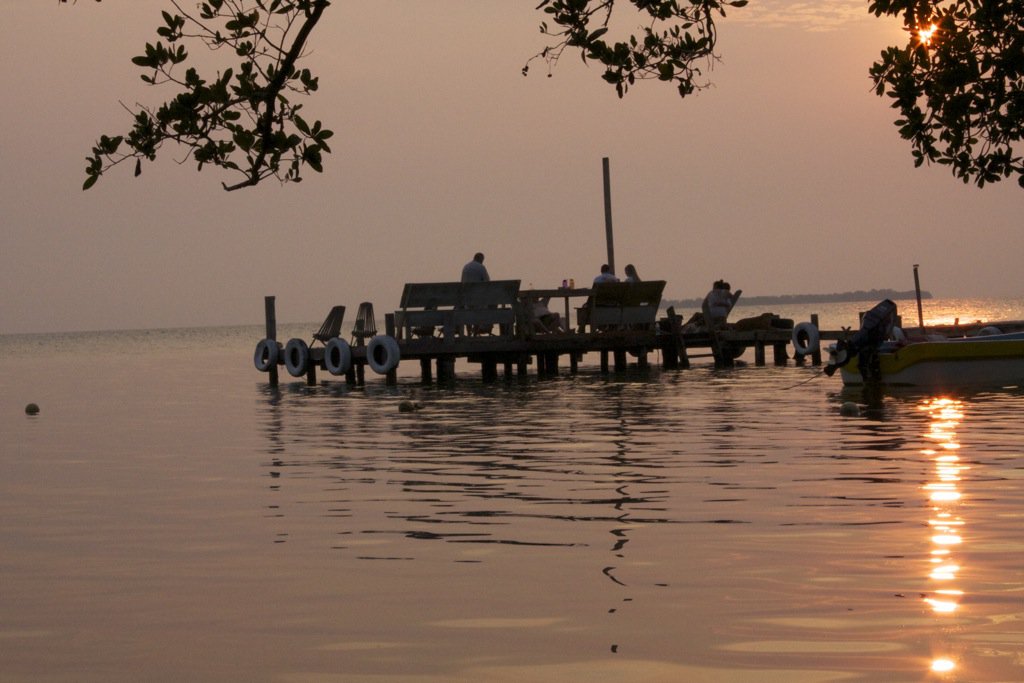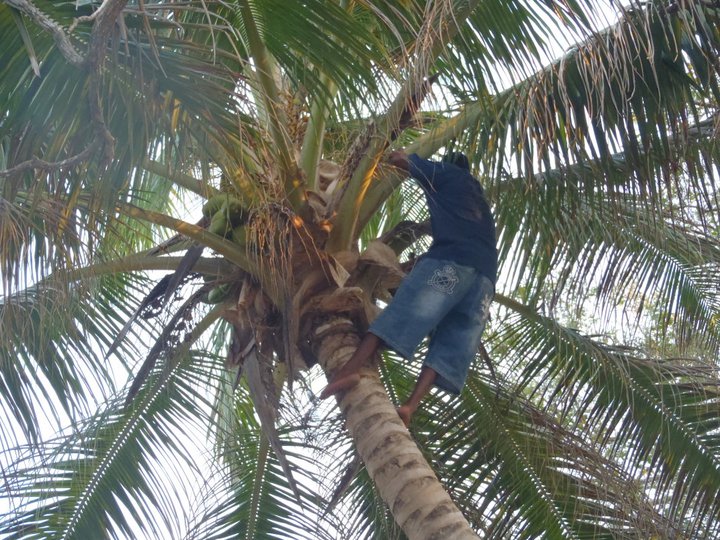Marine Biology in Belize
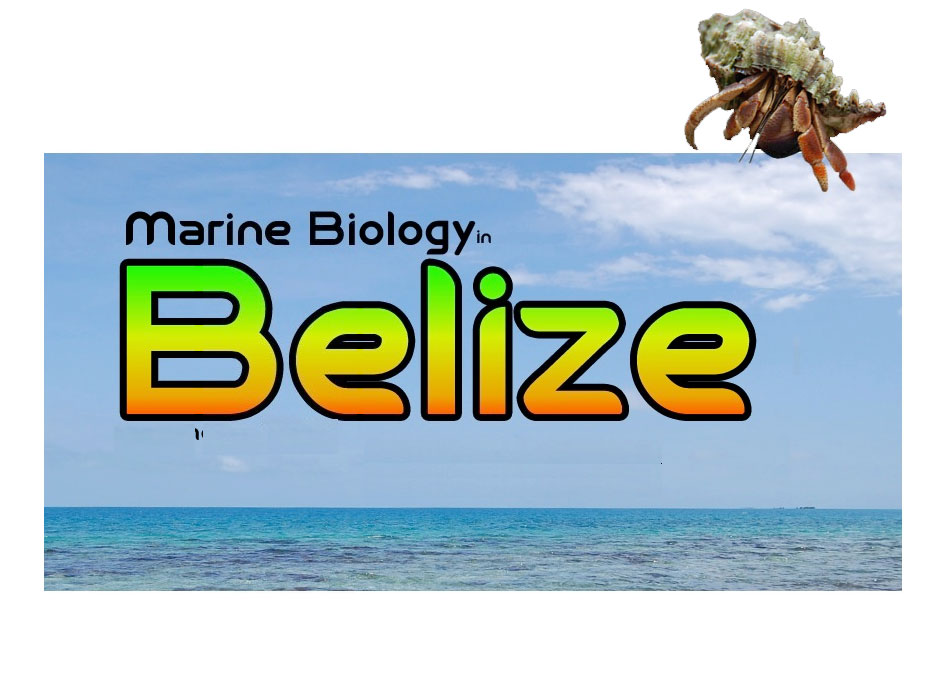 Click here to see the video of previous trips and Tobacco Caye
Click here to see the video of previous trips and Tobacco Caye
-
Course Information
The Course: This is a hands-on field course taught within various tropical marine ecosystems on the coast of Belize including riverine, seagrass meadows, mangrove systems, and various reef communities. The course will focus on the ecology of these systems and the natural history of their inhabitants, as well as examining environmental impacts and conservation efforts as they relate to the cultures and politics of Belizean society. Credit for this course is 4 hours as BIOL 4620, Advanced Topics in Ecology and Evolution. This course is both academically and physically rigorous. A basic swim test is required because extensive snorkeling is involved.
The Prerequisite/Co-requisite: Ecology (Biology 3370) or permission of instructor. Students must be competent swimmers and will be required to take a swim test prior to the start date of the trip.
Dates and Location: 2022 Maymester. The course will have 3 orientation meetings at KSU during the spring semester. Travel in Belize will be May 16 - May 23, and include two nights on the mainland at the Monkey Bay Wildlife Sanctuary and five nights at their Tobacco Caye campus located on an offshore island along the Western Hemisphere’s longest barrier reef. Upon return to KSU campus, the class will meet regularly for the remainder of the maymester (May 24 - May 27). Because the stations are located in remote areas, they are relatively undisturbed by tourism, so students will be able to observe a large variety of species not commonly seen by tourists.
The Tenative Travel Schedule for 2022:16 May - Departure from Atlanta. Arrival Belize International, then transport to the town of Dangriga followed by water taxi to Tobacco Caye. Introduction to the island, dinner, and overnight on Tobacco Caye.
17 May – Breakfast. Full day boat excursion in the South Water Caye Marine Reserve with several snorkel stops. Picnic lunch on South Water Caye. Carrie Bow Marine Lab visit. Return to Tobacco Caye in the late afternoon, journaling, and dinner. Night snorkel from the dock on Tobacco Caye (underwater lights provided).
18 May – Breakfast. Half-day boat excursion in the Tobacco Range. Return to Tobacco Caye for lunch. Afternoon for local quantitative data sampling. Journaling and dinner, evening lecture and discussion, evening lecture and discussion, and overnight on Tobacco Caye.
19 May – Breakfast. Half-day boat excursion. Return to Tobacco Caye for lunch. Afternoon for independent projects. Journaling, dinner, night snorkel, and overnight on Tobacco Caye.
20 May – Breakfast. Half-day boat excursion. Lunch. Afternoon for local quantitative data sampling. Dinner, evening presentation of projects, and last overnight on Tobacco Caye.
21 May – Breakfast, then early departure by water taxi to Dangriga. Bus transfer to Monkey Bay Wildlife Sanctuary, lunch, dinner, visit to the Belize Zoo. Overnight at Monkey Bay Wildlife Sanctuary.
22 May – Breakfast. Blue Hole National Park (cenote and cave) in morning. Lunch. Monkey Bay Wildlife Sanctuary river trip in afternoon. Dinner. Overnight at Monkey Bay Wildlife Sanctuary.
23 May – Breakfast. Transport to Belize International Airport for return flight home.
While in Belize, students will be required to participate in field trips throughout each day (which at times may be physically demanding) and each evening (group meetings to work on field journals and to discuss field observations).
Basis for evaluation and final grade determination will include a marine organism identification prior to departure, a field Journal, a final research paper (due at end of semester), an oral presentation on your individual research project. and participation.
The Cost: Program Cost per participant is $1348 and includes all in-country travel (buses and boats), guides, all meals, all lodging, admission fees, and airport departure tax. Tuition is paid separately during registration and is not included in the above fee. The above price does not include round trip airfare (Atlanta - Belize City), vaccinations, cost of passport application, cost of ground transport to and from Atlanta Hartsfield International Airport, tips, incidental expenses, souvenirs, or drinks that are not a part of regular meals. Students must also supply their own mask, fins, and snorkel, as well as other items typically associated with travel and outdoor activities.
Financial Aid: Upon application, KSU students may be able to apply for a scholarship to defray part of the program cost. There is a good chance that other federal grants, loans and scholarships that you are eligible for will also apply. Be sure to contact the KSU Institute for Global Initiatives and the program director to inquire about study abroad scholarships.
How to Sign up for the Course: The application is online through the Education Abroad Office. Click here to apply. A deposit of $300 is due at the time of application. Application deadline is 1 February 2022. Students will be admitted to the course through this on-line application on first come, first serve basis based on paying the deposit AND completing the medical clearance form. If the course is full, you will be placed on a waiting list.
You will be required to pass a basic swim test that will be arranged during the spring semester. More details on the swim test will be available later. If you have any questions or concerns about your swimming compatibility for the trip, please talk to Dr Mutchler, Dr. Dirnberger, or Dr. Reese.
Dr. Troy Mutchler is a marine biologist specializing on seagrasses and macroalgae. He work in marine systems include Belize, Mexico, and the U.S. Gulf Coast.
email: tmutchle@kennesaw.eduDr. Joseph Dirnberger has extensive teaching and research experience in both freshwater and marine biology. He has visited Belize on fourteen occasions, and his other travels include Costa Rica and Mexico, the Bahamas, Virgin Islands, Italy, Scotland, the Philippines, and Vietnam. email: jdirnber@kennesaw.edu
Dr. Scott Reese has research experience in the Caribbean coral reefs to the north along Mexico's Yucatan coast, and has also travelled in Belize (as well as Kuwait and Iraq courtesy of the U.S. Government). email: sreese@kennesaw.edu
The stations' knowledgeable guides will also an integral part of our educational experience. The guides, whose instructional experience is mainly with university study groups, are well-versed in local culture and natural history.
-
About Belize
Belize, formerly British Honduras, is a small English speaking country located along the western Caribbean on the Yucatan Peninsula of Central America. Over 40% of the country is preserved as parks and natural reserves. Though the population is small (less than half that of Cobb County), its cultures are diverse and include Mayans, Creoles, Mestizos, and the Garifuna.
Garifuna
- In 2001 UNESCO proclaimed the language, dance and music of the Garifuna as a Masterpiece of the Oral and Intangible Heritage of Humanity in Nicaragua, Honduras, and Belize. In 2005 the First Garifuna Summit was held in Corn Island, Nicaragua with the participation of the government of other Central American countries.
- The Garinagu are descendants of Carib, Arawak and West African people.
- Their language is primarily derived from Arawak and Carib, with English, French and Spanish to a lesser degree.
- Garifuna music is quite different from the rest of Central America. The most famous form is punta.
- Its associated musical style, which has the dancers move their hips in a circular motion. An evolved form of traditional music, still usually played using traditional instruments, punta has seen some modernization and electrification in the 1970s; this is called punta rock.
- Drums play a very important role in Garifuna music.
- There are primarily two types of drums used: the primero (tenor drum) and the segunda (bass drum).
Mayan
- Originating in the Yucatan around 2600 B.C., they rose to prominence around A.D. 250 in present-day southern Mexico, Guatemala, western Honduras, El Salvador, and northern Belize.
- The Mayans developed astronomy, calendrical systems and hieroglyphic writing.
- They were noted as well for elaborate and highly decorated ceremonial architecture, including temple-pyramids, palaces and observatories.
- They were also skilled farmers, clearing large sections of tropical rain forest and, where groundwater was scarce, building sizeable underground reservoirs for the storage of rainwater.
- The Mayans were equally skilled as weavers and potters, and cleared routes through jungles and swamps to foster extensive trade networks with distant peoples.
- The basic staple diet is corn. Everything is made fresh daily. Their days normally begin before the rising of the sun.
- Mayans women can be seen wearing huipils, simple cotton dresses decorated with embroidery. The designs in their embroidery and weaving can be traced back to pre-Columbian times. The huipils can help determine the region or family group that a Mayan is from based on the patterns and colors used in the design.
Creoles (Kriols)
- The Kriols are Creole descendants of English and Scottish log cutters, as well as Black African slaves brought to Belize.
- Kriol by its speakers, is an English-based creole language.
- Kriol has about 400,000 speakers in Belize
- From colonial days, music and dance have been an essential part of the Kriol culture.
- A style of music called Brukdownoriginated from the all night brams thrown by Kriol families that focuses both on social commentary and hijinks.
- The main staples of a Creole dinner are rice and beans with some type of meat and salad, whether potato, vegetable, or coleslaw, some game meats and ground foods.
Safety and Security Precautions while in Belize
Belize is a stable, U.S. friendly nation, and the official language is English.
Students must be competent swimmers. Participants will be required to take a swim test prior to the course (a date will be scheduled during the Spring semester). The course will involve extensive snorkeling (which can be easily taught to swimmers without previous snorkeling experience). Dangerous organisms typically associated with tropical systems and their associated risks will be explained to the students prior to field trips.
Tobacco Caye is accessible only by boat. There is a hospital in Dangriga, approximately one hour away. Staff at the field stations are trained for basic medical emergencies. Radio and cell phone also available for emergencies. Participants will be asked to get specific instructions for health and immunizations from their physicians since each person’s individual needs may vary. The Centers for Disease Control gives recommendations for immunizations for travel abroad so participants will be advised to consult their web site at http://www.cdc.gov/travel/ for these. The most likely disease risk is hepatitis A. Students are advised to apply mosquito repellent to reduce risk of malaria. Students are also advised not to handle wildlife or pets while in Belize to reduce risk of rabies.
Everyone who travels to Belize must have a valid passport. Participants who have expired passports should have them renewed. Participants who have never had a passport should begin the process of obtaining one immediately. Local post offices have information on where to get application forms and directions for obtaining a passport. Go to http://travel.state.gov/passport/passport_1738.html for more information. -
Accommodations
Living conditions are simple (no air conditioning), but clean and safe. Local cooks prepare delicious, mostly traditional Belizean meals, and they try to accommodate the special needs of vegetarians and others if asked in advance. Click on links to the left for more information.
-
Testimonials
From the Students:
“The whole trip was amazing! What could be better than 7 days of trekking through dense jungle with ferns that reach higher than some buildings, floating down a stream, ... snorkeling every day, seeing sharks, christmas tree worms, purple tunicates and holding an octopus, afternoon naps looking for the slightest bit of shade, sleeping on the dock, talking with the locals, and so, so much more! While memorizing all the organisms beforehand was tough, once we got out there it was amazing to be able to look around us and know what we were looking at and be able to identify it. I highly recommend this trip to anyone who is even considering marine biology as a future.”
“I've spent a lot of time traveling and I've seen many beautiful places...Belize was by far the most extraordinary adventure I've ever set out on. Bring a healthy appetite (the food on the island is incredible), your nerdy side (its ok...we've all got one), and lots of bug spray (or mosquito netting if you are smart!).
PS: If anyone has room for a small person in their suitcase this year, let me know!”
“This was my first time travelling to a different country, and I can definitely say that this trip was well worth the time it took to prepare academically and physically. You will see and experience things that you never thought to be possible. For those with a love of the ocean or nature in general, you will get to see species of animals and plants that you will be able to identify and or recognize. Every day you get to spend time with your classmates, which become your really good friends. You get to go tubing down a beautiful river, snorkel every day, see new marine life in every location, take naps in the hammocks all across the island, take night time hikes around the island, eat wonderful food, and spend the evenings watching the sun set at night across the ocean. If you are so inclined, you can even get up with Dr. D and watch the sun rise in the morning! This study abroad trip to Belize was the perfect opportunity to learn about other cultures, become more familiar with an aspect of biology that I am interested in, while still having a fantastic time. I would recommend this trip for any biology student, and I would continue to return to Belize every summer if given the opportunity.”
“This course is a stellar (and thorough!) introduction to marine ecosystems. Be prepared to have your marine biology knowledge go from 0 to 60 in about three days. If you love ACTIVE learning, and the idea of relaxing at night with a fairly chilled drink in your hand on the dock of a private island… then, this study abroad is for you! Work hard, play hard, wear sunscreen. And, if you are lucky, you might even get a glow show from the sex worms!”
“With the love of the ocean and the diverse marine life, Belize was one paradise! A dream that came true of mine. Living quarters the bomb! Why you may ask? Because your living on a remote island surrounded by the lovely ocean and red mangroves, with the people you get to know. Sort of like "Survivor" BUT oh! so much better and the educational experience that no can get unless you're in Belize... It's so much better than what you see on the Discovery Channel, because you're actually there! Take a moment to think of the awesome possibilities that Belize can take you. Got to love every moment and savor it because you never know when the opportunity comes again.”
"For some people it might be a dramatic adjustment to live on an island for a week with no cell phone or internet service, but I enjoyed that aspect of the trip because it allowed me to focus more on the surrounding nature and different species on and around the island. One piece of advice I have is to talk to people. Talk to anyone, everyone... The people on the island offer a wealth of information and everyone is there to help you learn and understand more about marine life systems and how they operate. Overall I really enjoyed this trip and if given the opportunity I would go back in a heartbeat!”
“This trip was nothing but incredible! Seeing the diverse marine life was beyond awesome! I love being able to recognize all of the organisms ...during and after the trip! Between snorkeling everyday and the most amazing food ever, I could definitely enjoy the island life for a much longer amount of time! I can’t think of one bad thing on the trip... It was amazing and any biology student that can, should go!!!!!!”
-
Photos
